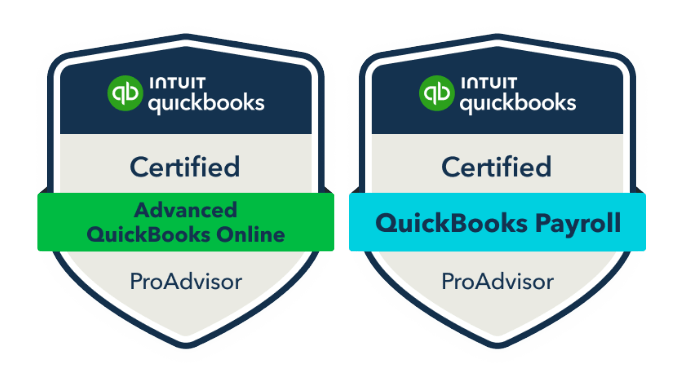Let’s be real—bookkeeping is not why you started your business. You had a passion, a skill, or an idea you wanted to bring to the world. And then… the financial side of things hit you like a surprise tax bill.
If you’ve ever looked at your books and thought, “This doesn’t make sense…” or “I’ll figure this out later,”—you’re not alone. But ignoring bookkeeping mistakes can lead to IRS penalties, lost profits, and financial headaches you don’t need.
The good news? Most bookkeeping mistakes are fixable—and better yet, avoidable! Let’s break down the 10 most common bookkeeping errors and how to correct them before they cost you time, money, or a major tax nightmare.
🚨 1. Not Reconciling Accounts Regularly
📌 The Mistake:
Your bank balance and your QuickBooks balance should match—but if they don’t, you may have missing, duplicate, or incorrectly categorized transactions lurking in your books.
Many small business owners forget to reconcile regularly, and before they know it, their financial reports are off, cash flow doesn’t add up, and tax time becomes a guessing game.
💡 Why It’s a Problem:
❌ Incorrect balances = inaccurate financial reports.
❌ You could be missing fraudulent or duplicate transactions.
❌ Cash flow problems can sneak up on you.
✅ How to Fix It:
- Reconcile your accounts every month (bank, credit card, PayPal, etc.).
- Use QuickBooks’ reconciliation tool to compare transactions.
- If your balances don’t match, find and fix the discrepancies ASAP!
🔗 Want a step-by-step guide? Read our article: How to Reconcile QuickBooks Online.
🚨 2. Mixing Business and Personal Expenses
📌 The Mistake:
Swiping your personal credit card for a business purchase—or worse, using your business funds for personal expenses—is a recipe for financial confusion and tax troubles.
💡 Why It’s a Problem:
❌ Messy books make tax deductions harder to track.
❌ The IRS frowns upon commingled finances and may disallow deductions.
❌ If you’re an LLC or corporation, this can pierce the corporate veil (meaning you lose legal protection!).
✅ How to Fix It:
- Open a separate business bank account and credit card.
- Categorize past mixed transactions properly (business vs. personal).
- If you accidentally used personal funds for a business purchase, reimburse yourself correctly through your books.
🔗 Want to clean this up? Watch for our upcoming article: Mixing Business and Personal Expenses? Here’s How to Fix It.
🚨 3. Misclassifying Transactions
📌 The Mistake:
Categorizing a business meal as an office supply, logging a contractor as an employee, or recording a loan as income—these small errors can lead to big financial reporting issues.
💡 Why It’s a Problem:
❌ Misclassified expenses can mean missed tax deductions.
❌ Financial reports won’t accurately reflect profitability.
❌ The IRS could flag incorrect classifications, leading to audits or penalties.
✅ How to Fix It:
- Review your chart of accounts to make sure you’re using the right categories.
- Regularly check your expense reports for misclassified transactions.
- If you’re unsure, consult a bookkeeper to get your categories right.
🔗 Need a crash course? Watch for our upcoming article: The Right Way to Categorize Transactions in QuickBooks.
🚨 4. Ignoring Accounts Receivable and Accounts Payable
📌 The Mistake:
Forgetting to track unpaid invoices or overdue bills can cripple your cash flow.
💡 Why It’s a Problem:
❌ Unpaid invoices = missing revenue.
❌ Late payments = penalties & damaged vendor relationships.
❌ Poor cash flow = difficulty covering expenses & payroll.
✅ How to Fix It:
- Set up automatic invoice reminders in QuickBooks.
- Track due dates for vendor payments to avoid late fees.
- Run monthly A/R & A/P reports to stay on top of cash flow.
🔗 Want better cash flow? Stay tuned for our upcoming article: Bookkeeping Clean-Up Checklist: Get Your Books in Order.
🚨 5. Forgetting to Track Cash Expenses
📌 The Mistake:
Cash transactions often go unrecorded, making your books incomplete.
💡 Why It’s a Problem:
❌ Expenses missing from your books = less accurate reports.
❌ You may miss tax deductions for business purchases.
❌ It’s harder to prove expenses if audited.
✅ How to Fix It:
- Always record cash payments immediately (use a receipt app or QuickBooks).
- Keep all physical receipts or scan them into a digital folder.
- Use a petty cash system to track small business purchases.
🚨 6. Not Keeping Receipts and Documentation
📌 The Mistake:
Without proper receipts, you risk losing deductions or facing IRS scrutiny.
💡 Why It’s a Problem:
❌ No receipts = IRS may disallow deductions.
❌ If audited, you may owe back taxes + penalties.
❌ Tracking expenses without proof can be frustrating and time-consuming.
✅ How to Fix It:
- Use a receipt tracking app like QuickBooks Receipt Capture.
- Store digital copies of all receipts in Google Drive or Dropbox.
- Set up a weekly habit to review & log receipts.
🔗 Need a better system? Watch for our upcoming article: Receipt Organization Guide.
🚨 7. Duplicate Transactions in QuickBooks
📌 The Mistake:
Bank feeds, manual entries, and third-party payment processors can cause duplicate transactions, inflating your income and expenses.
💡 Why It’s a Problem:
❌ Overstated income = higher taxes.
❌ Overstated expenses = misleading financial reports.
❌ Reconciling accounts becomes a nightmare.
✅ How to Fix It:
- Check for bank feed imports vs. manual entries.
- Use filters to check the bank register for duplicates.
- Cross-check with your bank statements before finalizing reports
- Remove or merge duplicate transactions properly.
🔗 Learn how to fix it. Stay tuned for our upcoming article: How Duplicate Transactions Skew Your Financial Reports.
🚨 8. Payroll Errors
📌 The Mistake:
Misclassifying employees, missing tax withholdings, or not paying payroll taxes on time can lead to IRS penalties.
💡 Why It’s a Problem:
❌ Employee misclassification can result in fines.
❌ Payroll tax mistakes can trigger IRS penalties.
❌ Late or incorrect paychecks hurt employee morale.
✅ How to Fix It:
- Use payroll software (QuickBooks Payroll, Gusto).
- Double-check employee vs. contractor classification.
- Ensure all tax withholdings are correctly reported.
🚀 Final Thoughts
Bookkeeping mistakes happen, but they don’t have to cost you time, money, or peace of mind. By staying on top of your records—and knowing when to ask for help—you can keep your business finances clean, accurate, and IRS-ready.
📩 Want expert help cleaning up your books? Let’s chat! Book a Free Consultation
🔗 Next Step: Read How to Reconcile QuickBooks Online! 🚀






0 Comments